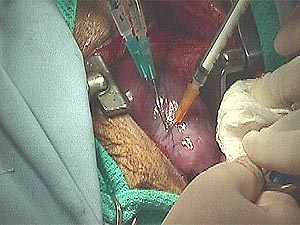|
Photos
Resources
Respond to this story
|
Medtronic and partner try muscle cells to mend damaged hearts
July 1, 2004
 |
| Thigh cells involved in muscle formation injected into heart tissue show promise in repairing damaged heart muscle. (Photo Courtesy of Genzyme) |
Fridley, Minn. — When you burn yourself, new skin grows.
When you break a bone, the body mends it.
 | |||
When you have a heart attack, heart muscle dies.
But Doris Taylor, says damaged heart muscle, or myocardium, does not repair itself. Taylor heads the Center for Cardiovascular Repair at the University of Minnesota.
"Heart cells don't divide. If they did, they'd actually probably be able to regenerate the injured region of the myocardium, and we wouldn't have this problem in the first place," says Taylor.
The problem is that the scarring of heart tissue can progress to heart failure, a disabling or even fatal condition in which the heart can't pump enough blood to the rest of the body. It affects 5 million people in the United States, about 20 million worldwide.
Taylor is a pioneer in heart repair who came to Minnesota from Duke University last year. Medtronic and Genzyme are funding the largest study of the strategy she helped develop.
In a speech at the MedEdge International conference in Minneapolis in June, she described how other muscle cells appear to help repair a damaged heart.
It's a little like a hair transplant for the heart, taking working tissue from one part of the patient's body and transplanting it to the area in need. Taylor says she tried thigh muscle cells to repair heart tissue.
"When we exercise, and we hurt our skeletal muscle, our arms or our legs, those get better. They get better because we have cells that hang around in those muscles to repair them. Those are the same cells that are essentially being transplanted in the heart with the notion that they'll grow up in the heart and become more like the heart, and become muscle in the heart," says Taylor.
|
Heart cells don't divide. If they did, they'd actually probably be able to regenerate the injured region of the myocardium.
- Doris A. Taylor, PhD |
From a small chunk of the patient's thigh muscle, millions of cells involved in muscle formation called myoblasts are produced in the lab, and then injected into the damaged region of the heart.
Years of research on animals and a few human studies suggest it improves the heart's ability to pump blood.
Medtronic already is a leader in treating heart failure with implantable pacemakers and defibrillators. Maura Donovan, a Medtronic research director, says the company had identified the cell therapy approach as one of a range of technologies that could hurt its business.
"But if we sit on the sidelines and watch, that's when things could potentially pose a bigger problem. And so I think Medtronic has very deliberately said, 'We will be involved in moving technology forward and participating in that evolution, even if it means that the products we are currently selling, we won't be selling in the future,'" says Donovan.
The new partnership aims to combine Medtronic's ability to get treatments to the right place in the body with Genzyme's skill at cell therapy.
Genzyme already markets a similar treatment that involves growing and implanting cartilage cells in the knee.
Medtronic has a long history navigating devices to the heart. Medtronic also recently acquired a company with a catheter able to deliver cells to the heart.
For now, the partnership's human research involves injecting cells during a bypass operation. If shown safe and effective, the next step, incorporating the catheter system, would prevent the need to open the patient's chest.
 | |||
Medtronic's partnership with Genzyme is only one of many in which a Medtronic device is coupled with another company's drug, or biotech therapy.
Thomas Gunderson, medical device industry analyst with Piper Jaffray in Minneapolis says many biotech products will need devices to get them to the right spot in the body. He expects Medtronic will continue finding partners and expanding its portfolio of treatments.
Gunderson says Medtronic is betting this partnership with Genzyme will eventually produce this reaction in patients with heart failure:
"'Oh, that's not a problem. I don't have to worry about going from class I to II to III to IV, and then becoming bedridden and eventually expiring,'" says Gunderson. "'I'll just go in and get some new tissue, and it will be an outpatient procedure. Why don't we go to a movie right afterwards?'"
But getting to that point is still years away.
|
News Headlines
|
Related Subjects
|
